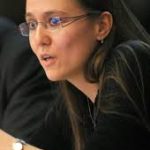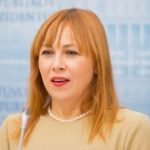2018 SMARTER Conference on Smart Specialisation and Territorial Development

Charlina Vitcheva was appointed Deputy Director General of the JRC in September 2016. Previous to this, she was Director of Smart and Sustainable Growth and Southern Europe at DG Regional and Urban Policy, and also held a position in Inclusive Growth, Territorial and Urban Development and Northern Europe. Before joining the Commission, Charlina spent 15 years in the Bulgarian public administration including at the Permanent Representation in Brussels, dealing mainly with agricultural and fisheries issues. During this period, she was actively involved in the accession negotiations of Bulgaria and headed, between 2000 and 2004, the negotiations teams in the area of agriculture and rural development, food safety and fisheries.

Andrés Rodríguez-Pose is a Professor of Economic Geography at the London School of Economics, where he was previously Head of the Department of Geography and Environment. He is the immediate Past President of the Regional Science Association International (2015-2017). He served as Vice-President of the RSAI in 2014 and has also been Vice-President (2012-2013) and Secretary (2001-2005) of the European Regional Science Association. He is a regular advisor to numerous international organizations, including the European Commission, the European Investment Bank, the World Bank, the Cities Alliance, the OECD, the International Labour Organization, the Food and Agriculture Organization, the Inter-American Development Bank, and the Development Bank of Latin America.
He is an editor of Economic Geography and sits on the editorial board of 33 other scholarly journals, including many of the leading international journals in economic geography, human geography, regional science, and management. He is a former holder of a European Research Council (ERC) Advanced Grant and the only social scientist to have been awarded the Royal Society-Wolfson Research Merit Award.

Dr. Charles Wessner currently teaches Global Innovation Policy at Georgetown University and is a powerful advocate of effective innovation policies. Previously, he served for two decades as a National Academies Scholar where he founded and directed the National Academy of Sciences Program on Technology, Innovation, and Entrepreneurship. He is recognized nationally and internationally for his expertise on innovation policy, including public-private partnerships, entrepreneurship, early-stage financing, 21st Century manufacturing, and the special needs and benefits of high-technology industry. As an outgrowth of his work with the U.S. government, he advises technology agencies, universities, and government ministries, including the Prime Ministers of countries in Europe and Asia. In addition, he cooperates closely with international organizations and lectures at major universities in the United States and abroad. The overarching goal of his work is to develop a better understanding of how we can bring new technologies forward to address global challenges in health, climate, energy, water, infrastructure, and security. Reflecting his commitment to international cooperation, he was recently named an Officer of the Order of Merit by the President of France.

Elisabetta Marinelli is a Scientific Officer at the European Commission Joint Research Centre (Seville, Spain). An economist by training, she holds a PhD from the London School of Economics. She has published articles in journals such as Regional Studies, Technovation, Environment and Planning and The Journal of Business Research. Over the years she has researched a variety of topics, including graduates’ migration, the R&D investment strategies of MNEs, technology foresight and regional development. More recently she has been working on Smart Specialisation Strategies (an EC policy tool for knowledge-based regional development), with a particular attention to the role universities, the mechanisms of stakeholders’ interaction and the monitoring and governance processes.

Simona Iammarino is Professor of Economic Geography at the Department of Geography & Environment of the London School of Economics and Political Science. She is currently Head of Department (01/01/2014 – 31/08/2017), and academic member of the LSE Council and Court of Governors (2016-2019). Simona’s main research interests lie in the following areas: Multinational corporations, location and innovation strategies, and local impacts; Geography of innovation and technological change; Regional and local economic development and policy. She was co-editor of Regional Studies (2008-2013). She has published extensively in major refereed journals, and co-authored two books widely cited in the literature: Multinational Corporations and European Regional Systems of Innovation (with J.A. Cantwell, 2003), and Multinationals and Economic Geography. Location, Technology, and Innovation (with P. McCann, 2013). Simona has a long-term experience in externally funded international research projects, and in consultancy projects for various international organisations (e.g. EU Commission, OECD, United Nations) and government agencies.

Peter Berkowitz is Head of Unit for Smart and Sustainable Growth in the Directorate General for Regional and Urban Policy in the European Commission. This unit is responsible for smart specialisation and regional investment in the digital economy, energy, the environment, transport and climate change. From 2008 to 2016, he was Head of Unit for Policy Development, including the preparation and negotiation of the Commission’s proposals for the reform of Cohesion Policy 2014-2020.

Inger Midtkandal is Science and Technology Counsellor at Royal Norwegian Embassy’s commercial section Innovation Norway in New Delhi, India. She has more than 15 years of experience working with research and innovation policy at regional, national and international level from India, the Research Council of Norway and as a Seconded National Expert to European Commission, Joint Research Center, IPTS in Spain. She has held responsibilities for governance and tool development related to design and implementation of R&I strategies and for trans-regional and international collaboration within research and innovation. She also has experience from private SME manufacturing industry. Her educational background is in Economic and Political Geography from the University of Oslo (NO), University of Pavia (IT) and Roskilde University Centre (DK).

Henry Wai-chung Yeung (PhD Manchester) is Distinguished Professor (and Professor of Economic Geography) at the National University of Singapore, Co-Director of GPN@NUS Centre, and Director of the JY Pillay Comparative Asia Research Centre in the NUS Global Asia Institute. His research interests cover economic globalization, global production networks, East Asian firms, and the political economy of development. In December 2017, he was selected by the American Association of Geographers to receive the AAG Distinguished Scholarship Honors for 2018 “in recognition of his extraordinary scholarship and leadership in the discipline”. Earlier in June 2017, he was conferred the Royal Geographical Society (with IBG) Murchison Award 2017 in the UK for “pioneering publications in the field of globalisation”. His latest monographs are Strategic Coupling: East Asian Industrial Transformation in the New Global Economy (Cornell Studies in Political Economy Series, Cornell University Press, Ithaca, April 2016) and Global Production Networks: Theorizing Economic Development in an Interconnected World (with Neil Coe, Oxford University Press, Oxford, April 2015). His previous authored books are: Transnational Corporations and Business Networks (Routledge, 1998), Entrepreneurship and the Internationalisation of Asian Firms (Edward Elgar, 2002), Chinese Capitalism in a Global Era (Routledge, 2004), and Economic Geography: A Contemporary Introduction (with Neil Coe and Phil Kelly, Wiley, 2007/2013). He has published another 7 edited books, over 95 academic journal articles, and 50 book chapters. He is Editor of Environment and Planning A and Economic Geography, and serves on 20 other international journals. He is an elected Fellow of the Academy of Social Sciences (UK) and a Fellow of the Royal Geographical Society-Institute of British Geographers (UK) and the Regional Studies Association (UK).

Caroline Paunov is Senior Economist and Head of Secretariat for the OECD Working Party on Innovation and Technology Policy (TIP) at the Directorate for Science, Technology, and Innovation of the OECD. She currently oversees the Working Party’s work on the implications of the digital transformation for innovation policy across the OECD and on boosting knowledge transfer between industry and science. To find answers to key policy questions she experiments extensively with combining semantic and econometric analyses tools. She has conducted in-depth work on (digital) innovation and its impacts on inclusive growth. A development economist by training Caroline has also written about private sector development and implemented several national reviews of intellectual property rights systems in Asia and Latin America. Caroline regularly organizes conferences and workshops that bring together policy shapers and experts and gives invited presentations at different events. Specialized in applied econometrics, her research work has been published in leading academic journals. Previously, she worked for the World Bank, the United Nations and co-operated on various projects for the public sectors in Brazil, Spain and Germany. She holds a B.A. and M.A. (Hons) from the University of Oxford, a M.Sc. from the University Pompeu Fabra and a Ph.D. in Economics from the University of London.

Slavo Radosevic is Professor of Industry and Innovation Studies at School of Slavonic and East European Studies, University College London where he has also been acting and deputy director. His research interests are in the area of science, technology, industry, innovation and growth in countries of central and Eastern Europe and he continues to be involved in international projects in this area. He is acting as an expert for the various DGs of the European Commission, as a consultant to UN Economic Commission for Europe, OECD, World Bank, Asian Development Bank, UNESCO and several governments in CEE. He is a special advisor to the EC Commissioner for Regional and Urban Policy, research director of UCL Centre for Comparative Studies of Emerging Economies and Fellow of the UC European Institute.
He has published extensively in international journals on issues of innovation and innovation policy. Prof. Radosevic is the author of ‘International Technology Transfer and Catch Up in Economic Development’, Edward Elgar, 1999. He is also the co-editor of volumes on knowledge-based entrepreneurship, European innovation policy, industrial networks, EU smart specialization, industrial restructuring, on the knowledge-based economy in central and Eastern Europe, and two volumes on science policy in central and south-east Europe. He is co-editor of Advances in Theory and practice of smart specialisation, Elsevier, 2018.

urgita Petrauskienė assumed office of the Minister of Education and Science in December 2016.
She has obtained a Bachelor’s degree in English Philology from Vilnius Pedagogical University (now – Lithuanian University of Educational Sciences) and a Master’s degree in Business Administration and Management from Vilnius University International Business School.
Jurgita Petrauskienė started her professional carrier as a teacher/lecturer of English at secondary and higher schools (1995-1999); worked as a project assistant at PHARE Coordination Centre of Vocational Education and Training Reform (1997-2001). In 2003, she took a position of the Head of International Programmes Division, later, of the Deputy Director of the Agency of International Science and Technology Development. In 2007, she was appointed as the Director of Research and Higher Education Monitoring and Analysis Centre (MOSTA) (2007-2016).
Jurgita Petrauskienė used to be a part of various national and international expert groups: ERAWATCH network, ERAC monitoring group, European Network of National Foresight correspondents, EU RTD Evaluation Network, BFUG WG, WG for Evaluation of the Scientific Research Performance of Lithuanian Higher Education and Research Institutions, Knowledge Economy Forum, National Research and Innovation Smart Specialization Strategy framing coordination team.

Caroline Cohen is a Policy Analyst at the European Commission Joint Research Centre (Seville, Spain). She hold a BA in politics and philosophy and a Master in European Regional Development from Cardiff University. Since 2016, Caroline has been working within the Smart Specialisation Platform, with particular attention on the analysis of stakeholder’s interactions and the changes that have occurred at national and regional level thanks to the implementation of Smart Specialisation Strategies.
She has substantial experience in collaborative research and policy applications into the field of sustainable development. From 2008 to 2015, she was head of communication and public relations for the French National Centre for Scientific Research (CNRS) in Aquitaine, collaborating with more than 50 research laboratories, regional authorities, competitiveness clusters and education authorities.